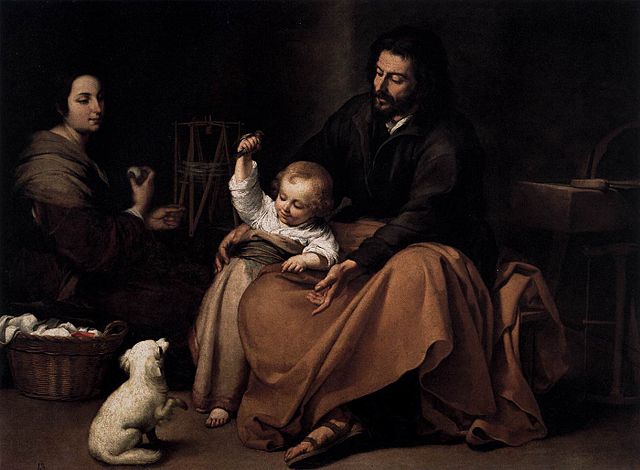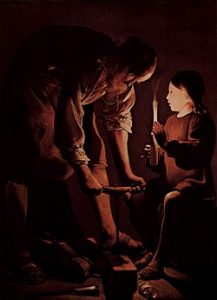 by Theresa Cavicchio
by Theresa CavicchioTraveling back in time two thousand or so years, to the Holy Land, we come upon a small, unassuming Galilean village called Nazareth, “Village of the Shoot,” its name evoking the hope for a Messiah prophesied by Isaiah: “There shall come forth a shoot from the stump of Jesse (Is 11:1)” (Mike Aquilina, St. Joseph and His World).
Unbeknownst to the then-residents of Nazareth, this prophecy would find its fulfillment right in their midst, in the person of Jesus: in His divine nature, Son of God; in His human nature, Son of Mary and descendant of Jesse and his son, King David. Jesus’ earthly family would be headed by Joseph, His foster father, the saintliest of men – the man specifically chosen by God the Father to love, cherish, protect, and provide for Jesus and Mary.
So it was that the three we have come to know as the Holy Family lived there together for several decades. Theirs was a humble life filled with love for God and each other; a life threaded through with, and supported by, manual labor.
Mike Aquilina writes further: “[Joseph] is a son, a husband, a father. And he is a tekton -- a craftsman, an artisan. An ancient tradition tells us more specifically that his craft was carpentry, a trade in which he apprenticed his son Jesus. When people were astonished at Jesus’ teaching, they asked: ‘Is not this the carpenter’s son?’ (Mt 13:55).”
Joseph’s work, the work of a craftsman, did indeed support his family and provide for their needs, and the carpenter’s shop at Nazareth became the training ground where the Incarnate Son of God learned to work with His hands; learned the beauty and sacred value of human work. His teacher, the most loving and dedicated of teachers, the man privileged to fulfill this God-given role, was Joseph.
Much has been written and preached concerning the manual labor which formed the basis of Saint Joseph’s earthly life, even more so during the current Year of Saint Joseph promulgated by Pope Francis last December. And since the establishment of the Feast of Saint Joseph the Worker by Venerable Pope Pius XII in 1955, each year on May 1st, our attention understandably centers on this one aspect of Saint Joseph’s holy life.
 To strengthen and deepen our admiration for Saint Joseph, however, it is good to reflect on the many ways in which his work continued even after his death -- and in fact, continues still today.
To strengthen and deepen our admiration for Saint Joseph, however, it is good to reflect on the many ways in which his work continued even after his death -- and in fact, continues still today.
We can categorize these ongoing efforts in his roles as spiritual father, patron of numerous causes, and guardian of the Church.
~ Spiritual Father ~
According to Father Gary Caster, “As father of the Church, Joseph is rightly the father of each of her members. Joseph’s relationship with us is personal … He extends to us the same loving, guiding parental care he gave to Jesus, according to each of our needs” (Joseph: The Man Who Raised Jesus).
Even if he has been blessed with many children, a good father recognizes the distinctive voice of each and responds quickly and lovingly. The same is true for us when we approach Saint Joseph, our spiritual father, with our worries, concerns, fears, and also our joys. Sharing these with him, we are reassured: we can place our full faith, trust, and confidence in this most loving and patient of fathers.
~ Patron of Numerous Causes ~
In addition to his spiritual fatherhood, Saint Joseph is considered patron of a lengthy, diverse list, including but not limited to families, fathers, workers, carpenters and craftsmen/women, consecrated virgins, immigrants, and a happy, holy death.
Despite his prodigious assortment of patronages, a quote from Saint Thomas Aquinas perhaps best sums up Saint Joseph’s awesome capabilities: “Some saints are privileged to extend to us their patronage with particular efficacy in certain needs, but not in others; but our holy patron Saint Joseph has the power to assist us in all cases, in every necessity, in every undertaking” (emphasis supplied). (Source: yearofstjoseph.org)
~ Patron of the Universal Church ~
Among Saint Joseph’s numerous titles, perhaps the most far-reaching and inclusive is that of Patron of the Universal Church. Responding to the request of “the venerable prelates of the whole Catholic world,” on December 8, 1870, a decree was issued by the Vatican Sacred Congregation of Rites, stating in part:
“… it has now pleased our Most Holy Sovereign, Pope Pius IX, in order to entrust himself and all the faithful to the Patriarch Saint Joseph’s most powerful patronage, has chosen to comply with the prelates’ desire and has solemnly declared him Patron of the Catholic Church.”
It is totally fitting that the Universal Church established by Jesus rests in the strong, capable, hard-working hands of the man whom God placed as head of the first domestic church at Nazareth. We can take great comfort in this vitally important patronage, particularly in these times when our Church is beset with so many troubling challenges.
As Father Gary Caster concludes, “The work in Nazareth, while truly the stuff of ordinary life, was carried out by an extraordinary man. This work wasn’t only for Mary and Jesus but also for all women and men united with God in Christ by the power of the Holy Spirit. Joseph continues his work for us in the Church today.”
And thus will it be for all time; after all, to reiterate our title, a good man’s work is never done.
© All Rights Reserved, Living His Life Abundantly®/Women of Grace® http://www.womenofgrace.com
Women of Grace is hosting a book study based on the book, St. Joseph and His World by Mike Aquilina which begins on May 3. It's not too late to sign up! Click here for more details!
